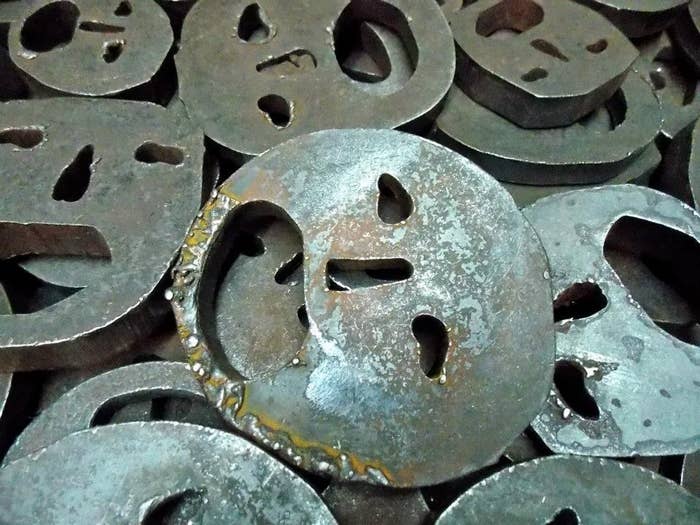
Two years ago I found myself waiting in line to pick up my audio guide for the Jewish Museum in Berlin, Germany. As you walk through the museum a strange feeling comes over you, a feeling you may only experience once or twice in your life. It's a mixture of sadness, guilt, uncertainty but mostly it's the uneasy feeling of fear. The fear you imagine every, single person must have felt for days on end, the fear that it will happen again and this time it will be you. It starts out low in your stomach and as you work your way through the exhibits it builds inside you. Part of you wants to find the nearest exit, try a German beer with your friends and drive the feeling away. The other part, the bigger part, makes you stay because you know you need to.
There is a part of the museum when you walk down a long hallway and out a door into a courtyard. The door is painted grey like the walls and before you open it to walk outside you feel hesitant, "Am I supposed to be here?", "Will I be able to get back in?" There's a moment of panic when you feel the door slam shut behind you and you're left at the bottom of a 79 foot concrete enclosure with the only bit of light coming through a small window. You forget you're in a museum and it's irregular shape and the lack of heat makes you disoriented and drowns you in a feeling of anxiety, you need to get out before you're trapped. The door opens and as other visitors come into the tower you hurry back into the building. The Holocaust Tower taught me that even in the most disorienting situations, you can always find a way out.
Throughout the entire museum there are spaces that were intentionally left empty, voids. You find yourself walking on top of 10,000 metal faces, you're in the memory void. The sound of the cold metal hitting against each other vibrates through your bones and you begin to question humanity. "How could someone do such horrible things to another human being?", "Could I be capable of doing those things?", "Could someone do those things to me?" You look down at the metal faces beneath you and you could crush them because they're only metal, they aren't human. Suddenly you find the answer to all your questions in a deep, dark place. "Yes, I could and so could someone else." We often describe the Nazis and other people who committed such horrible crimes against other humans as, evil. Their actions were evil and so were some of them but for the most part they were just human, like you and me. The Memory Void taught me that the real evil in the world is reducing human beings to sub-humans and we, the people of the world, need to fight back against that notion if-ever and whenever it rears its ugly head.
The last part of the museum was, for me, the most education and influential part of the entire museum. It consisted of several electronic pillars that displayed stories of what life was like after the liberation, after the war was over. It's a time period of history that isn't often focused on, we learn about the beginning, middle and end of the war but very often we don't stop to think about what those first few days of freedom were like, those first few years. After living through such tragedy, victims and bystanders alike, how do you pick up the pieces? Where do you go? How will people treat you? How will you treat others? But, somehow you do, you pick up the pieces, you find a place to call home and you begin to live again. The stories of survival taught me a very important life lesson. No matter the misery or the tragedy you experience, through strength you continue to wake up every day and live because life goes on.
The Holocaust taught us so many important things but most importantly it taught us about ourselves. There were so many people who were able to carry out unspeakable actions but we must also remember that there were people who were able to stand up and fight against the cruelty of the Nazi regime. The same evil and courage still lives inside each one of us and it's time we choose courage, we choose to unite as one body and stand up for each and every human life. To those out there trying to suppress human rights and annihilate certain races or religions, we must be brave enough to look them in the face and say, "No, not this time."
To find out more about the museum and how to donate visit their website! http://www.jmberlin.de/main/EN/homepage-EN.php

